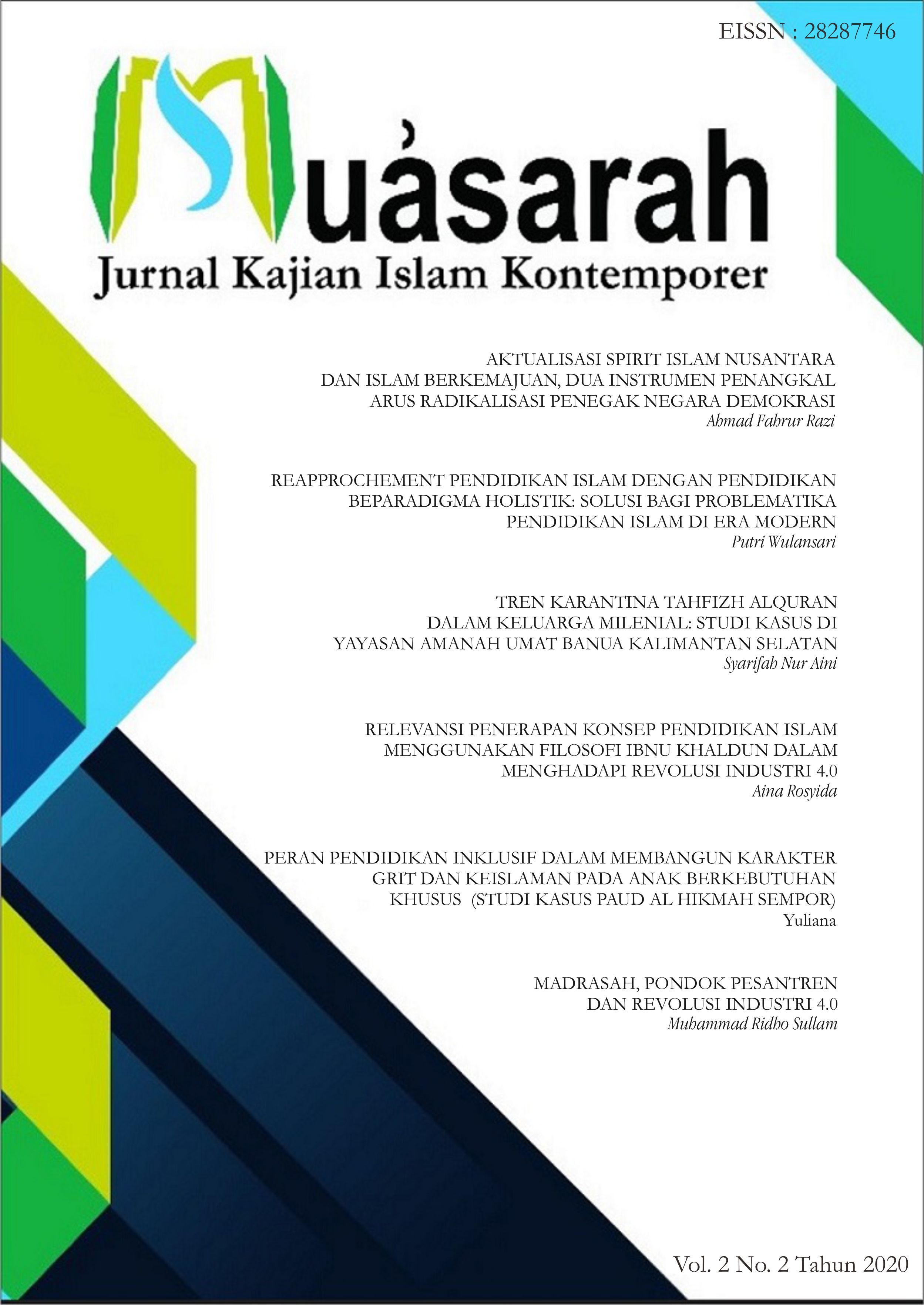RELEVANSI PENERAPAN KONSEP PENDIDIKAN ISLAM MENGGUNAKAN FILOSOFI IBNU KHALDUN DALAM MENGHADAPI REVOLUSI INDUSTRI 4.0
DOI:
https://doi.org/10.18592/msr.v2i2.4316Keywords:
Islamic Education, Philosophy, Industrial Revolution, Ibn KhaldunAbstract
The phenomenon of combining digital and internet technology with conventional industry is known as the era of industrial revolution 4.0, which has a big impact on all aspects of life. The measure of success in facing the industrial revolution 4.0 is Human Resources (HR). So that, education is a relevant way to deal with it. Islam requires to study and become an educated people. Therefore, researchers found the formulation of Islamic education has its own uniqueness with Ibn Khaldun's prominent ideas in terms of originality and beyond time. Based on this, the purpose of this research is to find out the relevance of the implementation of the concept of Islamic education which contains philosophy of Ibn Khaldun in facing the industrial revolution 4.0. The method used by the researcher is library research and described through qualitative - descriptive. To support the research, researcher uses two data sources namely primary data sources and secondary data sources. The technique of data collection is through library research, books, journals and references that support the research. The results showed that the concept of education that contained philosophy of Ibn Khaldun is relevant for dealing with the industrial revolution 4.0 with (1) development of proficiency (al-malakah or skill) (2) mastery of professional skills good thinking coaching. The conclusion of this study is that with the changing times that exist and the emergence of the latest innovations in education implicitly and explicitly have been designed in Islamic education.References
Anthony, A., Sediyono, E., & Iriani, A. (2020). Analisis Kesiapan Kerja Mahasiwa di Era Revolusi Industri 4.0 Menggunakan Soft—System Methodology. Jurnal Teknologi Informasi Dan Ilmu Komputer, 7(5), 1041–1050. https://doi.org/10.25126/jtiik.2020752380
Basri, H. (2009). Filsafat Pendidikan Islam. Pustaka Setia.
Bastian, I. (2006). Akuntansi Pendidikan. Erlangga.
Ibnu Khaldun. (1986). Muqaddimah Ibn Khaldun terjemah Ahmadie Thoha. Pustaka Firdaus.
Idri, H. (2015). Epistemologi Ilmu Pengetahuan, Ilmu Hadis, dan Ilmu Hukum Islam. Prenada Media.
Khaldun, I. (1967). The Muqaddimah Abd ar Rahman bin Muhammed Ibn Khaldun Translated by Franz Rosenthal. Princeton University Press.
Kompasiana.com. (2019, May 27). Dampak Revolusi Industri 4.0 terhadap Kehidupan Manusia. KOMPASIANA. https://www.kompasiana.com/indiraadia/5cebe3153ba7f7790b5e93a3/dampak-revolusi-industri-4-0-dalam-kehidupan-manusia
Mulyadi, S., & Raharjo, W. (2016). Psikologi Pendidikan dengan Pendekatan Teori-teori Baru dalam Psikologi. RajaGrafindo Persada.
Mulyasa. (2011). Menjadi Guru Profesional. Remaja Rosdakarya.
Mungin Eddy Wibowo. (2019). Konselor Profesional Abad 21. UNNES Press.
Muyahardjo, R. (2008). Filsafat Ilmu Pendidikan. Rosdakarya.
Niel, R. van. (2009). Munculnya Elit Modern Indonesia. Dunia Pustaka Jaya.
Nizar, S. (2002). Filsafat Pendidikan Islam (Pendekatan Historis, Teoritis dan Praktis). Ciputat Press.
Rahmat. (2019). Pendidikan Agama Islam: Analisis Kebijakan Pendidikan Agama Islam Indonesia Era 4.0. Literasi Nusantara.
Syam, A. R. (2019). Guru dan Pengembangan Kurikulum Pendidikan Agama Islam di Era Revolusi Industri 4.0. TADRIS: Jurnal Pendidikan Islam, 14(1), 1–18. https://doi.org/10.19105/tjpi.v14i1.2147
Wajdi, M. B. N. (2015). Pendidikan Ideal Menurut Ibnu Khaldun dalam Muqaddimah. Jurnal Lentera, 13(2), 226–235.
Downloads
Published
How to Cite
Issue
Section
License
Authors who publish with this journal agree to the following terms:
- Authors retain copyright and grant the journal right of first publication with the work simultaneously licensed under a Creative Commons Attribution License that allows others to share the work with an acknowledgement of the work's authorship and initial publication in this journal.
- Authors are able to enter into separate, additional contractual arrangements for the non-exclusive distribution of the journal's published version of the work (e.g., post it to an institutional repository or publish it in a book), with an acknowledgement of its initial publication in this journal.
- Authors are permitted and encouraged to post their work online (e.g., in institutional repositories or on their website) prior to and during the submission process, as it can lead to productive exchanges, as well as earlier and greater citation of published work.






